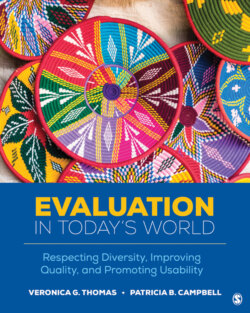Читать книгу Evaluation in Today’s World - Veronica G. Thomas - Страница 32
На сайте Литреса книга снята с продажи.
Voices From the Field
ОглавлениеMelvin E. Hall: Objectivity, Bias, and Being an Evaluator
I came into evaluation in part because I was aware of the myth of evaluator objectivity. People have built-in biases; we all do. Once you recognize that people have built-in structural biases, you have two choices—you can call them out on their biases, or you can find ways to have those biases balanced with other perspectives. I made the second choice.
The value I bring to evaluation is another worldview, one which will help other people understand their own biases as well as mine. Inherent bias is not only not unavoidable, but you don’t even want to try to avoid it—I believe that any knowledge you have biases you. For example, if I know the world is round, it biases me about believing anything contingent to the world being flat. That’s a positive bias. I don’t see bias as a negative thing. I see it as a necessary thing. The one caveat is not when bias is in the performance of the craft, but when bias is in the assumptions underlying the craft. Bias can be thorny to observe and thorny to deal with when melded into underlying assumptions.
There are little-b biases and big-B biases. Little-b biases impact how you communicate, how you collect data, and how you interpret experiences; it is the little day-to-day stuff. We have to recognize it will be there and be alert to it. I like to think that big-b bias is something I will be upfront about and take steps to mitigate. For example, I had a project that I had a positive bias toward. I know I am pro HBCUs [Historically Black Colleges and Universities]. I asked several colleagues to be my sounding board. I would send research briefs to them for their reaction. The process of writing it and thinking about it was one of the best things I could do to be aware of my biases.
Melvin Hall is a Professor of Educational Psychology at Northern Arizona University, Distinguished Scholar in the Marie Fielder Institute of Fielding Graduate University, and AAC&U Senior Scholar, Office of Undergraduate STEM Education, AAC&U He is also a founding affiliate faculty member of the Center for Culturally Responsive Evaluation and Assessment at the University of Illinois, Urbana. He was interviewed by co-author Patricia Campbell, in fall, 2019.
